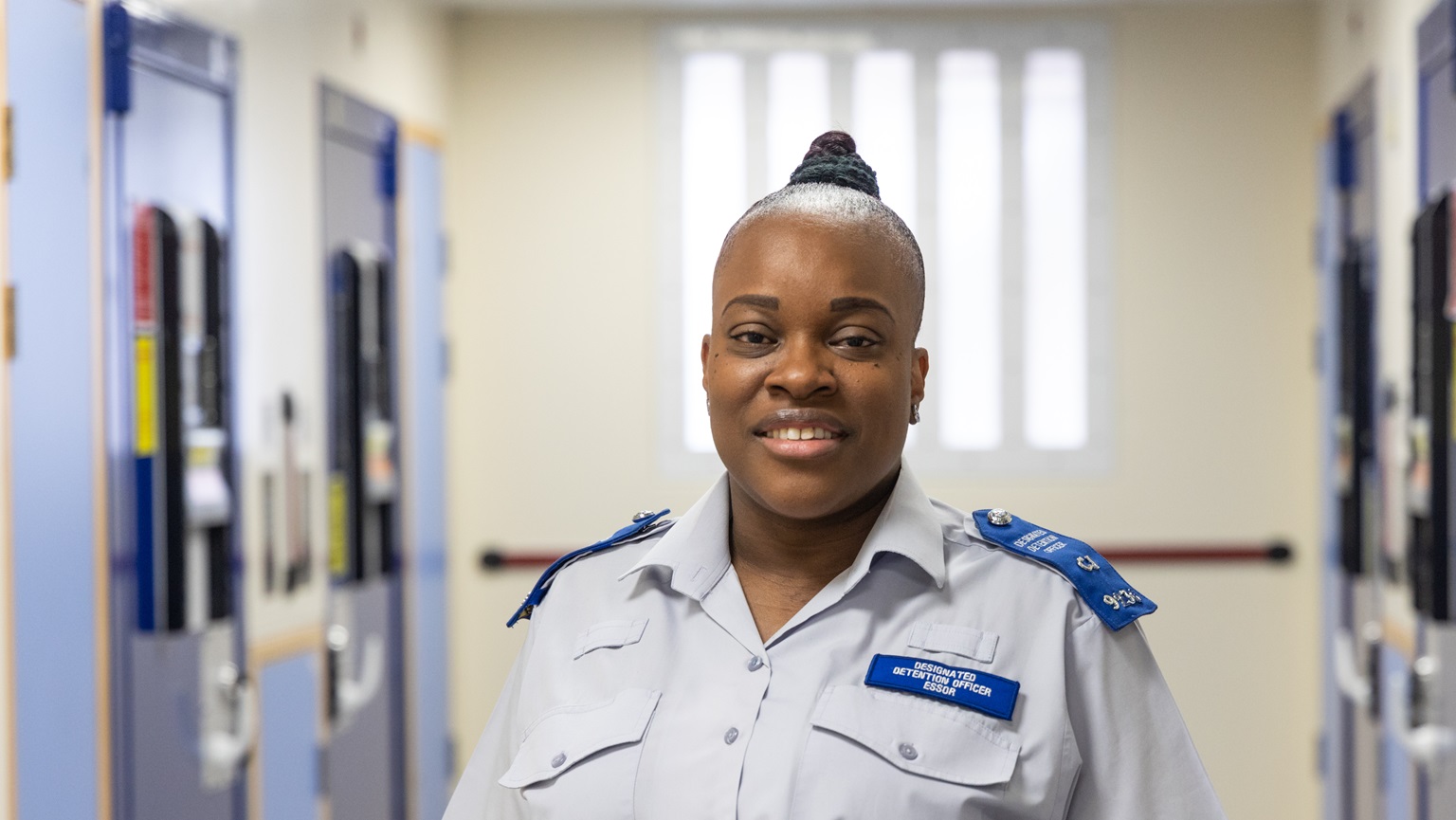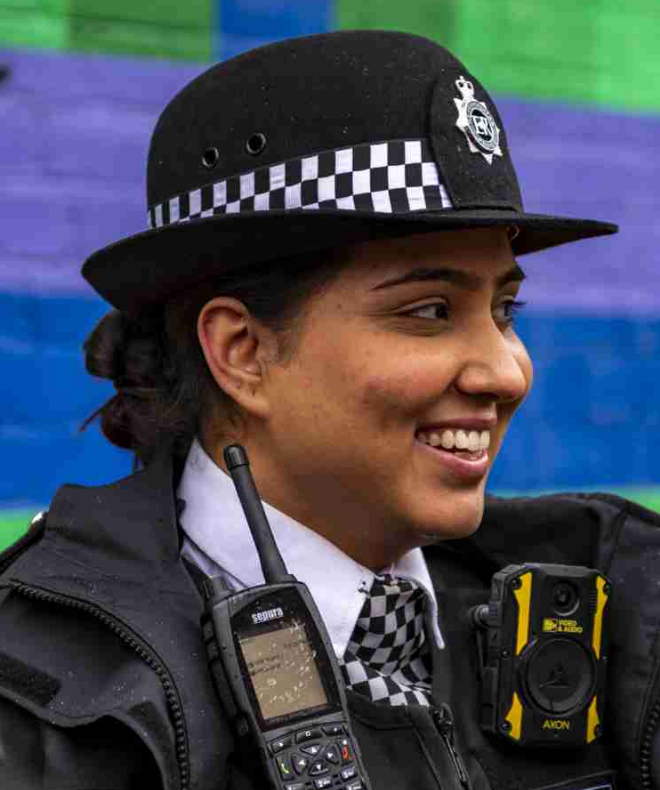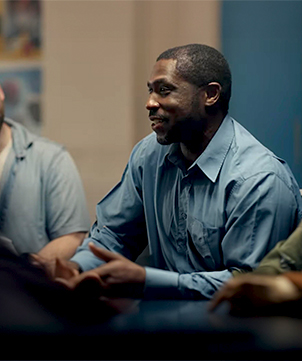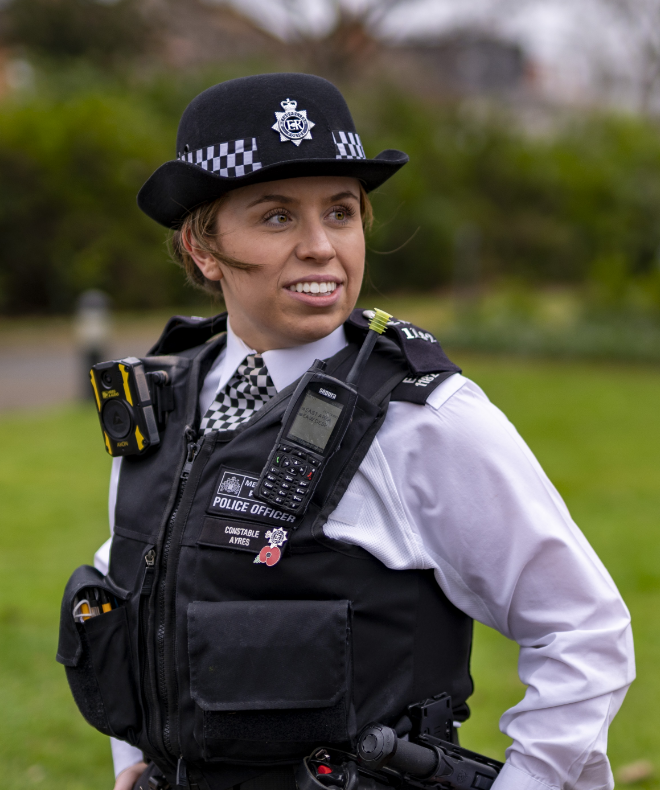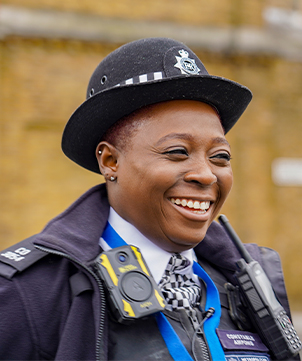Our Designated Detention Officers (DDOs) work in London’s 22 primary Police Station custody suites. Each one of these operates around the clock. Each year, we process over 170,000 individuals from different backgrounds, of different ages and with different needs. Could you join this dedicated team of officers and staff, supported by custody experts?
What it’s like day to day
You’ll work with the Custody Sergeant to manage detainees. In any one shift you could be dealing with teenagers, vulnerable people, high-risk detainees and those with complex needs. Some of these people may be experiencing one of the most challenging days of their lives, and you’ll provide a safe custody environment where their rights and entitlements are protected. You may also need to help them access support services that could be a crucial lifeline.
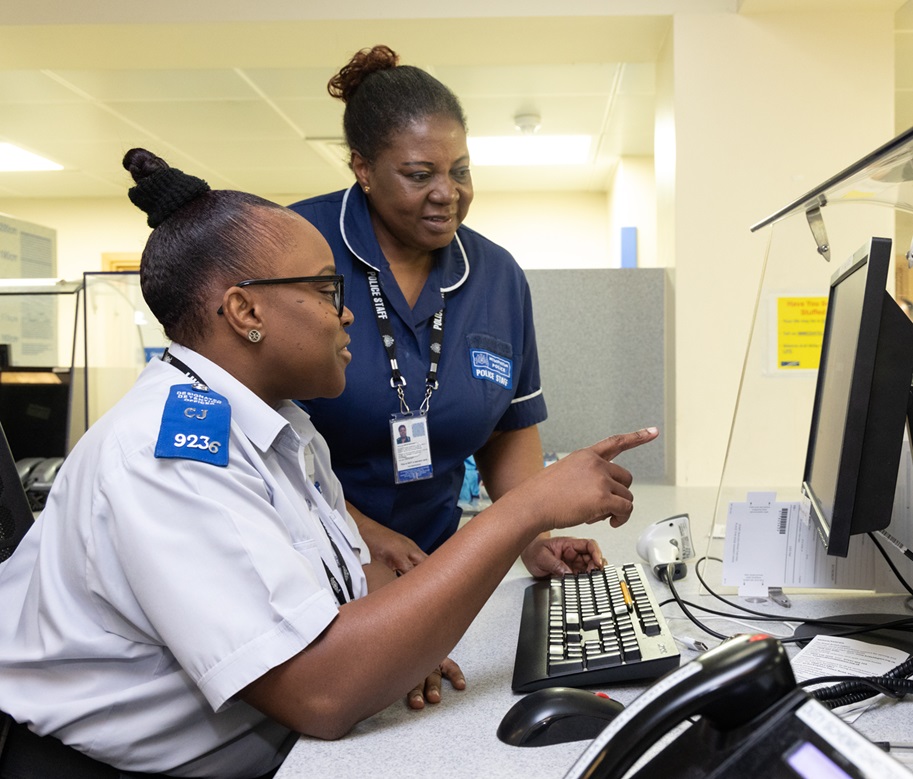
What you’ll do
Accurate data entry and activity logging is essential – you’ll use our electronic custody system. You’ll regularly monitor and visit all detainees, and you’ll also take fingerprints, footwear impressions, photos and DNA swabs, and perform drug testing procedures. You’ll talk to healthcare professionals, solicitors, other MPS employees, and those needing access to the custody suite or detainees. And you’ll look after detainees, including arranging and delivering meals.
What does it feel like?
Teamwork is a big part of this role. The role can be challenging, with some difficult experiences, and so the support you get from being part of a friendly and caring team is vital. There is also a more formal system of robust support to help you cope with any difficult experiences.
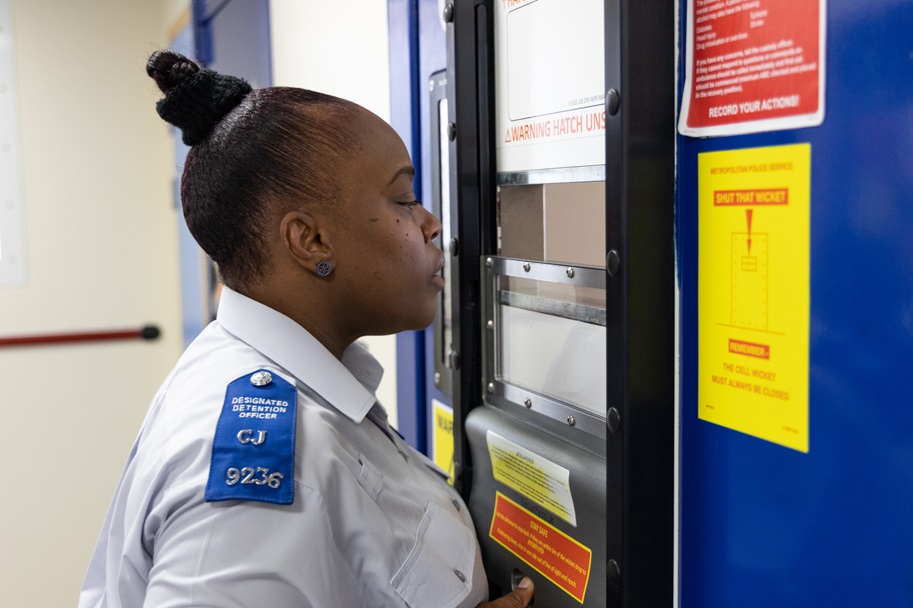
Shift patterns
Our custody suites are never closed. We operate a structured shift pattern with 12-hour shifts, with designated rest days. Shifts are either days or nights and you will need to do both. Rest days are grouped together. Although the days and times you work will vary for any particular week, they are arranged in advance.
Meet Charlie
Charlie is 35yrs old, has been a DDO for 10 years and is part of our LGBTQ+ network.
We asked them for an insight into their career path and personal journey.
-
Being a DDO can be both challenging and rewarding, it can be very busy from the start of your shift until you go home where each detainee is never the same. Some and most have many needs such as; emotional well-being, drugs, illnesses and cultural beliefs. Some can become violent when they are charged and remanded for court and others can be pleased when they are in custody, as it may be a cry for help where we can support them. For example, if they need help for drugs where we can get them on a drug programme this has the potential to turn their lives around. On top of all of this, I love working 12 hour shifts as you get to have plenty of time off as well, to be with your family/friends and enjoying a social life!
-
Every situation could potentially become confrontational as emotions are high. However, one situation I particularly remember was when I was tasked to search a detainee, he was verbally abusive, swearing and trying to provoke me. It is tough in a situation like that but it is important to stay calm and in control. You definitely need strong characteristics and not take words personally but also remember this behaviour isn’t acceptable and you can tell your Custody Sergeant/inspector about it. Your team are always there to give you advice in a situation like that too, so you will not be alone.
-
When I joined the police, I was not openly gay but after a while being in the job and being around other staff and officers who were, it made me realise that you are accepted regardless of sexual orientation; I have made a good circle of friends now and cannot believe how easy it was to talk about my own struggles. Having experienced this first hand, the MPS has a really accessible support network for LGBTQ+ staff/officers which have their own dedicated association. There’s loads of leaflets, posters and information on the intranet where you can join social events and social activities regularly. This can all be done anonymously or openly depending on your own personal situation. They also link in with Stonewall for advice mainly but do provide training course opportunities, should any member wish to explore this. Needless to say, I have now grown in strength and confidence, both at work and in my personal life.
-
I cannot emphasis enough to just BE YOURSELF from the beginning and you will NOT be judged or treated any differently from your colleagues or supervisors. You need to be confident, have an open mind set, resilience, never judge and most of all be able to communicate with people. Good luck to you all – it really is the best job ever!
Meet Kol
Kol is an experienced team member in Met Detention, having worked with us for four years.
We asked him what being a DDO means to him.
-
There’s no risk of Groundhog Day working in Met Detention – each day is different!
Your shift will start with a handover from the previous shift, highlighting any issues or concerns with the detainees we have in. There are then elements of routine – checking the cells, requesting any repairs required, processing new detainees being booked into the custody suite, preparing meals, accounting for property and so on. Part of our role is responding to cell buzzers from the detainees and checking in on them throughout the day, this is where your day can become less routine as anything can happen. -
When I go home each day, I know that I have done everything I can for the people in our care – we’ve tried to meet their needs, and we may have made a positive impact on their lives. Being detained can be really tough, and we are there for detainees when they want to talk or express themselves. Having somebody know that I’m there to help and not to judge is really important to me.
It’s also really satisfying working as part of this team, knowing you’re there for each other and having each other’s backs. -
We are often trying to help people who simply don’t want to be helped, they throw your efforts back in your face. It’s hard for people to recognise that we’re not casting judgement or forming an opinion, we are just there to help during what is a really difficult time. This becomes even harder if the detainee is drunk, both because people can become non-cooperative and because it’s really hard to identify underlying medical needs when somebody has been drinking
We have a duty to perform regular cell checks and to check on the people in our care, and quite naturally people will fall asleep in their cell. There’s always a slight sense of the unknown when rousing detainees who have come to us in an intoxicated state, as they can sometimes lash out upon being awoken. Knowing what we have risk assessment practices in place helps as you know you’re doing what you need to do, but it can still feel hard as there’s an element of the unknown.
-
I went through quite a bit of training on joining – Officer Safety Training (OST) and emergency life support training being two of the big ones. Once I started in my role, I had additional training to allow me to process new detainees coming into custody and setting up or updating custody records on the system. Since then, I’ve undertaken training to allow me to test substances which I suspect to be drugs, as well as having annual refreshers on many of the things I’m accredited in to keep my skills topped up and current.
-
We’re a well-oiled machine! We share a daily task rota, and work together to make sure everything gets done. I know I can ask for help with my share if needed, as we’re all working towards the same goal of a smooth running custody suite – nobody sits back and waits for others to do things, we all pitch in to get everything done. I always know my team have my back, and we bounce off each other throughout our shifts. We do get a bit of downtime during throughout the day, and during those times you have an opportunity to have a chat with your team and sometimes even have a laugh – life would be tough if we didn’t do this.
-
It was a bit of a shock to the system coming into this from a sales background, but the more I did the job the more I grew to enjoy it. It was hard at first and there was a lot to adjust myself to, but I can honestly say I love my job now.
You have to think about whether shift working is right for you. It’s perfect for me, I’m a father and a husband, and my working pattern gives me the opportunity to spend days with my family that I wouldn’t have been able to do in a normal job.
This job makes me feel like I’m making a bit of a difference to people, I’m here to help after all. We come across all sorts of people in this role, and that has really helped me develop my people and communication skills, learning how to identify individuals needs and what approach is going to work for them.
You do need to have a thick skin for this job, and you really should think about that before deciding to apply. Some people can be mean and you have to be able to shrug that off, it just comes with the territory. I switch off as I walk out of the door at the end of my shift, it’s important to be able to do that.
Every day brings challenges, and some days you blink and the whole day is over. That’s all part of the fun of working in this type of role. It’s what makes this different to all others that I’ve tried before.
If after reading this you’re still interested, that says to me you’ve got it… so apply!
Meet Feriba
Feriba has worked within Met Detention for six years, so is a good person to ask what it’s like!
-
Feriba has worked within Met Detention for six years, so is a good person to ask what it’s like!
-
There is no such thing. You’ll probably get the same answer from everybody you ask, but it’s really true! As you enter the custody suite, you should expect the unexpected. You do on occasion have a quiet shift, but those days don’t come by very often! When they do, these are the most treasured days for the custody suite team.
I have a 7am start for work, so it’s important to be organised in the morning. I pack my breakfast and lunch to have me ready for the shift, but will warn that you shouldn’t be surprised if you end up eating your breakfast for lunch and your lunch for dinner, it happens more than you’d expect. Your day will normally start with a briefing from the outgoing shift, and then anything can happen!
-
I have had countless, but one in particular always sticks with me. Whilst conducting my cell checks, I noticed a detainee turning in his sleep. I watched for a bit to check if he would settle, but he continued twisting and turning to the extent he was moving across the cell bench. I quickly opened the door to get into the cell, but was too late as he slipped off the bench and hit his head. Blood started pouring from a wound on his head, and he started having a fit. I was terrified. I shouted for help and hit the panic alarm, then placed my hand between his head and the floor to try to avoid any further injury. Help arrived with an ambulance being there within minutes, but it was a very intense experience.
During your training you are equipped with first aid skills so I knew what to do, but training can’t prepare you for the emotions that surface in that type of situation, and I found that really hard. Experience does however help, and you learn to manage your emotions through what are quite scary times. We’re all human though so it’s normal to feel something, your team are always there when you need to chat through something like this as sharing your thoughts helps.
-
Before I started this job, I lacked knowledge, but I didn’t know this until I started working – does that make sense? I became aware of the struggles the police service have which I don’t think are really appreciated by your average member of the public, and I learnt how to deal with people of all walks of life. I don’t believe that I would’ve gained these people skills anywhere else, and definitely not as quickly.
We’re given formal training all the time, so that’s really good, but I’m also gaining life skills each and every day. Did I know before that somebody who is dependent on alcohol could die from withdrawal if not treated? No, never would I have guessed. Did I know what to do if I saw somebody on the street having a fit? No, but now I do and that might just save somebody’s life one day. The skills I have gained are life-long.
-
When in College, I was making my way home one evening with a bunch of books as my A level exams were a few days away. I was only a minute away from home when I was attacked and robbed, being left badly beaten. It felt like forever until help arrived and I was taken to hospital. From that day, I had officers come to check on my welfare, gave me advice and a few gadgets should anything like that occur again. I felt supported, taken care of and loved. That, made me chose my career path. It was then I realised what I wanted to be – a police officer.
On the final home visit, I asked about the process and how I could apply. They explained that unfortunately there weren’t opportunities to apply to be a PC at the time, but I could explore being a DDO or a Special Constable as a stepping stone. I was only 17 at the time and couldn’t apply until I was 18, so I waited for my birthday to roll around to submit my application. Looking at things now, the path I had chosen to go through as opposed to applying directly to be a PC has prepared me far greater than a direct entry into a world I was never ready for.
-
Be ready for anything. It’s not an easy job, and it will test you. It’ll test your emotion to its limits. You’ll need stacks of patience and need to be tolerant. Carry compassion with you at all times, and have a strong mind. You need to be made of tough stuff, and you’ll need to be able to shrug it off when you have a bad day. You’ll need to be able to care and support someone who isn’t giving you that same respect. Oh and you’ll also need a strong stomach, some of the fragrances you will come across will blow your mind!
If that hasn’t put you off, you’re made of the right stuff, so apply! -
It was a bit of a shock to the system coming into this from a sales background, but the more I did the job the more I grew to enjoy it. It was hard at first and there was a lot to adjust myself to, but I can honestly say I love my job now.
You have to think about whether shift working is right for you. It’s perfect for me, I’m a father and a husband, and my working pattern gives me the opportunity to spend days with my family that I wouldn’t have been able to do in a normal job.
This job makes me feel like I’m making a bit of a difference to people, I’m here to help after all. We come across all sorts of people in this role, and that has really helped me develop my people and communication skills, learning how to identify individuals needs and what approach is going to work for them.
You do need to have a thick skin for this job, and you really should think about that before deciding to apply. Some people can be mean and you have to be able to shrug that off, it just comes with the territory. I switch off as I walk out of the door at the end of my shift, it’s important to be able to do that.
Every day brings challenges, and some days you blink and the whole day is over. That’s all part of the fun of working in this type of role. It’s what makes this different to all others that I’ve tried before.
If after reading this you’re still interested, that says to me you’ve got it… so apply!
How do I apply?
Training
You’ll start with seven weeks of training, to equip you with the skills required to be a DDO. This includes things like emergency life support skills or how to use handcuffs, as well as detailed training around relevant legislation and your designated powers.
You’ll be assessed throughout the training programme – this is a pass or fail course.
Once you graduate and start working within the custody environment, your first year with us will be probationary. Remember that support is always available, both from your colleagues and your Custody Sergeant. The training continues throughout your career as you develop new skills and explore more areas of development.

Integrity
I will always try to do the right thing. I will be fair and consistent in everything I do, being mindful of the impact of my actions. I will actively challenge those whose behaviour falls below public and the Met’s expectations.

Courage
I will strive to build trust with the public, colleagues, and partners, by being open, honest and taking ownership for what I have done and why. I will admit when I make mistakes, learn from them and improve.

Accountable
I will strive to build trust with the public, colleagues, and partners, by being open, honest and taking ownership for what I have done and why. I will admit when I make mistakes, learn from them and improve.

Respect
I will respect the rights of everyone I meet. I will listen to individual perspectives and needs. I will try my best to understand a diverse range of views and achieve the best possible outcomes for the public.

Empathy
I will care about communities and colleagues and try to understand their perspectives and experiences, at all times. I will be kind and listen and understand without judgement. I will take time to clarify and explain my decisions.
-
Other qualifications
- There are no minimum academic qualifications to join us, but you will need to have a good standard of English and excellent communication skills.
- You must be 18 or over when you apply
-
Your health and fitness
Policing isn’t easy, and although you don’t need to be an Olympic athlete to join you do need to be relatively fit and healthy to cope with the demands of the job.
- You will need to pass a fitness test. Start preparing now by watching our YouTube video for tips and download the Met’s six-week training programme. Or find out more on the College of Policing website.
- Some medical conditions can prevent you from being able to cope with the physical and mental demands of the job. Find out which here: HM government medical standards
- You must meet the police eyesight standards. Your eyesight is tested as part of your medical, which takes place during the application process.
-
Other things to be aware of
- If you’re from outside the European Economic Area (EEA), you’ll need leave to enter or leave to remain in the UK for 30 months. You will need to be living in the UK free of restrictions or be entitled to do so.
- If you’re from the European Economic Area (EEA) you’ll need EU pre-settled or settled status or leave to enter/leave to remain and work in the UK without restriction for a period of at least 30 months.
- If you have tattoos you’ll need to tell us about it when you apply. We have a tattoo policy that you’ll need to meet. You can’t join with tattoos that are on your face, or the sides and front of your neck above the collar line. We must also be confident that your tattoos aren’t offensive, violent, discriminatory, political or rude. See the full tattoo policy below
-
Vetting
Working for the Met means holding a position of trust. Vetting checks are an important way to maintain our high standards and reassure Londoners that appropriate checks are done.
We’ll check your:
- Criminal, intelligence and national security records
- Public records
- Credit agency records (in some cases)
- Social media presence
-
Cautions or criminal convictions
Having a previous caution or conviction doesn’t necessarily disqualify you from applying, but please be as open and honest as possible. If you hide anything from us or are dishonest in your application, you will be rejected.
Any information we gather in the vetting process is confidential and kept separate from your other recruitment data. We try to be as open and fair as possible during this process.
-
Reasons you can’t join
- If you have unpaid debts or liabilities, an outstanding county court judgement, or you can’t manage loans or debts sensibly.
- If you are or have been a member of organisations like the British National Party (BNP), Combat 18 or the National Front. This isn’t a full list.
- If you use illegal drugs. You’ll have to pass a substance misuse tests before you can join us.
Applying to become a
Designated Detention Officer (DDO)
The process of joining the Met can take a little while. It’s an important job and we can’t rush the process. But if you’re successful you’ll be beginning a career that could change your life – and the lives of Londoners everywhere.
At each stage of your application you’ll be contacted by our recruitment team. They’ll give you information and support, to help you be your best.
-
Step 1: Online registration form and application
First, you’ll need to complete and submit a simple online registration form and application form.
-
Step 2: Interview
If you are eligible for the role, we’ll invite you to an interview.
-
Step 3: Medical and fitness test
f your interview goes well, we’ll ask you to come to a face-to-face medical assessment. This includes both an eye test and a hearing test. We also give you a substance misuse test and we’ll take your fingerprints.
At this stage, you’ll also take a fitness (bleep) test. As a DDO you need to pass the same test as police officers.
You can get ready for this stage in advance. Watch our YouTube video for tips and download.
-
Step 4: Pre-employment checks and vetting
Pass these tests and we need to do some standard medical, reference and security checks. This is normal for anyone joining the Met.
Exactly how long this will take can vary from person to person depending on your circumstances. Once we have successfully completed all required pre-employment checks, we’ll agree a start date with you.
You can find out more on the vetting process here.

Our careers are open to members of every community. Take your place with us and be part of the change.

